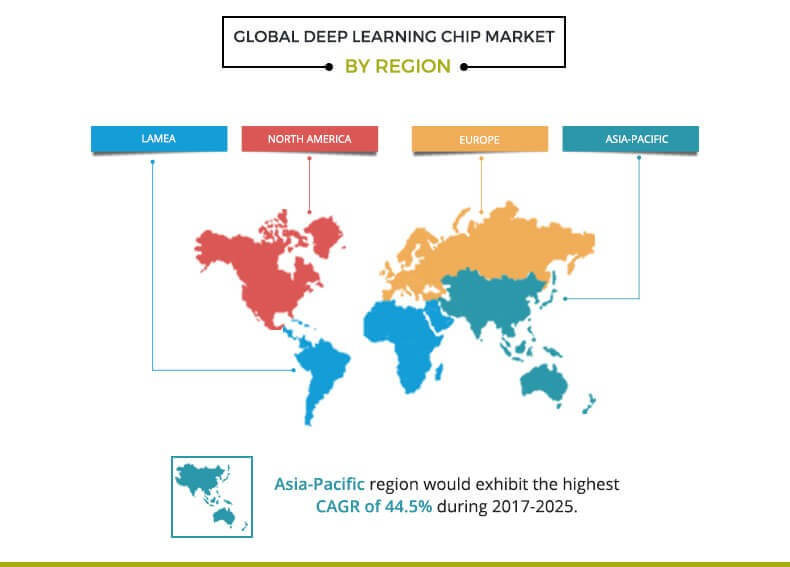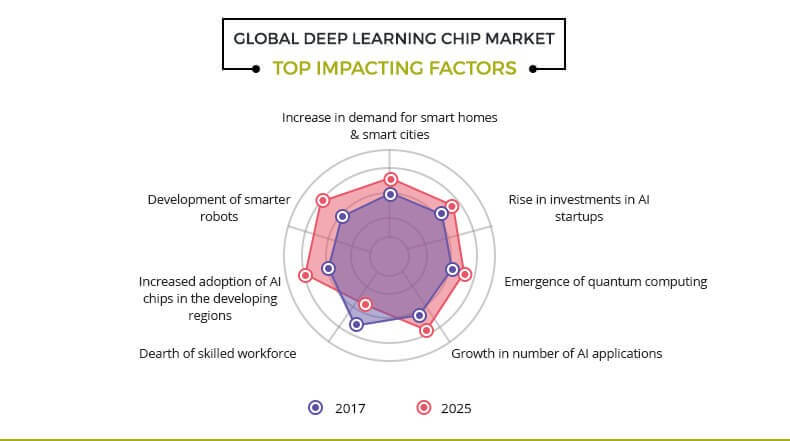Deep Learning Chip Market Overview:
Deep learning is a sub-set of machine learning, which is a sub-set of artificial intelligence (AI) that is achieved to perform tasks related to AI. Deep learning works as a brain, which has been penetrating in several industries around the world. This technology is achieved with software, such as computer vision, voice recognition, speech synthesis, machine translation, game playing, drug discovery, and robotics. Deep learning chips are specialized Silicon chips, which incorporate AI and machine learning technology.
View full report: https://www.futureindustryinsight.com/product/deep-learning-chip-market/
Emergence of quantum computing and enhanced implementation of deep learning chips in robotics drive the growth of the global deep learning chip market considerably. In addition, emergence of autonomous robotics-robots that develop and control themselves autonomously-is anticipated to provide potential growth opportunities for the market. However, dearth of skilled workforce is one of the major restraints of the market. Most of the tasks, such as testing, bug fixing, cloud implementation, and others, are taken over by deep learning chips; however, delivery of such tasks lacks essential skillsets.
The major companies profiled in the report include AMD (Advanced Micro Devices), Google, Inc., Intel Corporation, NVIDIA, Baidu, Bitmain Technologies, Qualcomm, Amazon, Xilinx, and Samsung.

Get more information on this report : Request Sample Pages
The global deep learning chipset market is segmented based on chip type, industry vertical, technology, and geography. By chip type, the market is categorized into graphics processing unit (GPU), application-specific integrated circuit (ASIC), field-programmable gate array (FPGA), central processing unit (CPU), and others. System-on-chip, system-in-package, multi-chip module, and others are the technologies taken into consideration. The industry verticals taken into account in the study include media & advertising, BFSI, IT & telecom, retail, healthcare, automotive & transportation, and others.
Geographically, the deep learning chip industry is sub-segmented into North America, Europe, Asia-Pacific, and LAMEA.

Get more information on this report : Request Sample Pages

Get more information on this report : Request Sample Pages
The significant impacting factors in the global deep learning chip industry include increase in demand for smart homes and smart cities, rise in investments in AI startups, emergence of quantum computing, growth in the number of AI applications, dearth of skilled workforce, increase in adoption of deep learning chips in the developing regions, and development of smarter robots. Each of these factors is anticipated to have a definite impact on the deep learning chipset market during the forecast period.
Increase in Demand for Smart Homes and Smart Cities
AI provides impetus to initiate smart city programs in developing countries, such as India. Tools and technologies that are artificially intelligent possess a massive potential to transform interconnected digital homes and smart cities. Furthermore, creation of a chip that embeds an inbuilt AI network has emerged as an opportunity for the deep learning chip market.
Rise in Investments in AI Startups
Multiple countries, especially the U.S., witness a considerable growth in tech start-ups every year, which are backed by various venture capitalists and venture capitals, thus increasing the market scope. Various key players have been innovating to build a dedicated platform; for instance, Mythic’s platform has an advantage of processing digital/analog calculations in memory, which results in enhanced performance, accuracy, and power life. Furthermore, surge in need to integrate video surveillance and AI and rise in government spending for cyber security solutions that are integrated with real-time analytics and AI are anticipated to boost the growth of the deep learning chipset market.
Emergence of Quantum Computing
Quantum computers take seconds to complete a calculation that would otherwise take thousands of years; for instance, Google has a quantum computer that is 100 million times faster than today’s computing systems. Quantum computers are an innovative transformation of artificial intelligence, big data, and machine learning. Thus, emergence of quantum computing has fueled the growth of the deep learning chipset market. Furthermore, processor performance has improved around five times since Intel’s introduction of the Pentium processors. Firstly, because of the smaller size of transistors, which has collapsed from 800 nm to 16 nm. This enables to create processors with billions of transistors, which operate in the gigahertz range and increase the computational power drastically. Secondly, owing to the improved graphic processing units (GPUs) over the traditional central processing units (CPUs). Hence, a single processor performs complex calculations in seconds, which during the 90s would have required multiple lifetimes. With the help of the internet’s size and scale, deep learning handles large data sets at a very low cost. These factors have been helping to drive the growth of the global deep learning chip industry.
Dearth of Skilled Workforce
AI consists of complex algorithms for its development. In addition, management of AI and automated systems is difficult at times. This requires exceptional software engineering skills and a notable experience to deal with distributed and concurrent programming or debugging with communication protocols. However, many regions, particularly the emerging economies, lack people with such skills. Hence, dearth of a skilled workforce is a prominent restraining force of the deep learning chip industry.
Increased Adoption of Deep Learning Chips in the Developing Regions
Recent developments in the emerging economies, such as China and India, across various industry verticals, which include media & advertising, finance, retail, healthcare, automotive & transportation, and others, have created a major growth potential for AI. The time and cost benefits provided by AI are the major growth factors leading to its increased adoption in the developing regions. All these factors together fuel the growth of the market.
Development of Smarter Robots
Many players have been building superior robot brains, which would enable machines to operate autonomously by deployment; for instance, Rethink Robotics’ Baxter is a research robot, which is trained accordingly. Similarly, human-like robots are invented by Hanson Robotics, which carry a peculiar conversation and recall personal history. Furthermore, development of smarter virtual assistants is opportunistic for the overall market. A notable illustration is Jarvis Corp, which is a start-up in the conceptual phases. It has been building a virtual assistant that answers questions by accessing the internet and acting as an internet server and acts as a control for connected devices.
Key Benefits
- This study comprises an analytical depiction of the global deep learning chip market size with current trends and future estimations to depict the imminent investment pockets.
- The overall deep learning chip industry potential is determined to understand the profitable trends to gain a stronger foothold.
- The report presents information related to key drivers, restraints, and opportunities with a detailed impact analysis.
- The current deep learning chip market is quantitatively analyzed from 2018 to 2025 to benchmark the financial competency.
- Porter’s Five Forces analysis illustrates the potency of the buyers and suppliers in the global deep learning chip market.
- The report includes the deep learning chip market share of key vendors and deep learning chip market trends…
View full report: https://www.futureindustryinsight.com/product/deep-learning-chip-market/
About Us:
FutureIndustryInsight™ provides quantified B2B research on 20,000 high growth emerging opportunities/threats which will impact 75% to 85% of worldwide companies’ revenues. Currently servicing 5000 customers worldwide including 80% of global Fortune 1000 companies as clients. Almost 70,000 top officers across eight industries worldwide approach FutureIndustryInsight™ for their painpoints around revenues decisions.
Media Contact:
Name: Rahul
Designation: Global Sales Manager
Ph: +17132421323
